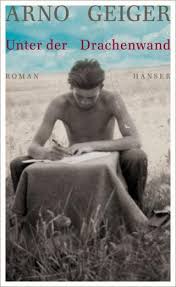After reading the Austrian writer Arno Geiger's terrific 2005 novel Es geht uns gut (see my review), which won the German Book Prize that year, I was eager to read his newest book Unter der Drachenwand, which was published earlier this year. I was not disappointed. But, while Geiger's earlier novel covered the sweep of modern Austrian history from the 1930s to 2001 through a family saga, Unter der Drachenwand deals with just one year – 1944, the final full year of war.
Most of the novel consists of the diary of a young soldier from Vienna – Veit Kolbe – who is sent home from the eastern front to convalesce from terrible shrapnel wounds. But the painful injuries to his legs and jaw are just a small part of his ordeal. Far worse is the PTSD he suffers from 5 years of war and the atrocities he witnessed. Unable to bear listening to his father's pro-Nazi platitudes at home, Veit finds refuge in the small village of Mondsee, nestled "under the Drachenwand" (the "Dragonwall" is a mountain in Upper Austria). Barely able to speak, the traumatized young man begins writing down his impressions and thoughts. The Drachenwand offers a measure of shelter from the horrors of war, and Veit slowly starts the healing process. He writes about the other refugees from war he encounters in Mondsee: a camp of teenage girls evacuated from the city to escape the relentless bombing, a young mother from Darmstadt – Margot – caring for her infant daughter while her husband is fighting on the eastern front, and an eccentric gardener – "the Brazilian" – who had returned (against his will) from South America. Veit's physical wounds heal, and – in Margot's bed, and in long conversations with the Brazilian – he finds his way back to the realm of the living.
For the most part, life in Mondsee remains as tranquil as it ever was. The only evidence of the raging war are the flotillas of American bombers flying overhead on their way to targets in Vienna and beyond. Veit and most of the other residents realize the war is lost and are simply trying to survive as they wait for the inevitable end; only a few believe that Hitler's Wunderwaffe (V2 rockets) can turn the tide.
The reader, however, is not spared the horrors of war. Interspersed with Veit's diaries are letters from Margot's mother in Darmstadt in which she describes, in graphic detail, the firebombing that results in massive casualties and total destruction of the city. And then there are the desperate and heartbreaking letters of the Jewish dental technician from Vienna – Oskar Mayer – who successfully smuggles his wife and young son across the border into Hungary, only to fall into the clutches of the Nazis after Germany invades and occupies that country. Eventually his family is caught up in a Gestapo sweep on the streets of Budapest and are murdered in Auschwitz.
Because Geiger uses the modalities of the diary and letters, Unter der Drachenwand lacks the emotional power of Es geht uns gut where the reader is exposed to the most intimate thoughts of the Erlach family members through lengthy interior monologues. Even so, the novel is an excellent read and will no doubt be translated into English. Arno Geiger is an immensely talented writer.


